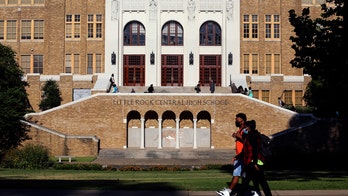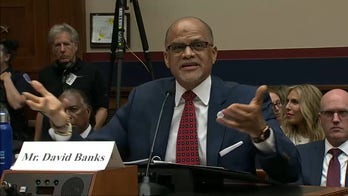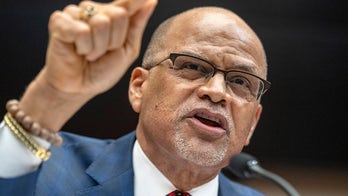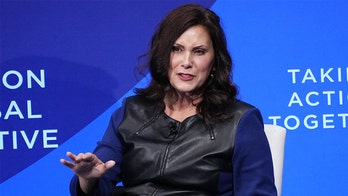Republican presidential candidate Mitt Romney delivered what his campaign labeled a "major" foreign policy speech at The Citadel where he slammed President Obama's view of the world and pushed for what he called the "American Century."
With a backdrop of cadets in the crucial political state of South Carolina, Romney said the "American Century" meant, "America has the strongest economy and the strongest military in the world. In an American Century, America leads the free world and the free world leads the entire world."
The economy is dominating the 2012 election cycle, but national security is still a key component for candidates. Having spent most of his adult life in business, Romney tried to boost up his foreign policy credentials.
He advocated for beefing up the Navy, and getting rid of defense cuts.
The former Massachusetts governor said Obama does not share the same view of America's role. "I believe we are an exceptional country with a unique destiny and role in the world. Not exceptional, as the president has derisively said, in the way that the British think Great Britain is exceptional or the Greeks think Greece is exceptional. In Barack Obama's profoundly mistaken view, there is nothing unique about the United States."
He argued America shouldn't just jump from one crisis to another, and should not "to be shaped by events rather to shape events."
"I will not surrender America's role in the world. This is very simple: If you do not want America to be the strongest nation on Earth, I am not your president. You have that president today," he said.
Romney briefly touched on countries providing a threat, including Pakistan, but seemed to hone in on Iran as the country to watch. He also brought up the importance of watching China, Russia, Cuba and Venezuela.
The former Massachusetts governor did not make major references to the war on terror, specifically the recent killings of Usama bin Laden and Anwar al-Awlaki, which both happened on Obama's watch. Nor did he get into specifics of drawing down the wars in Iraq or Afghanistan.
The absence of those items, the White House quickly picked up on. "Governor Romney raised real questions about his capacity to lead this country and wage the fight against terrorism. He didn't outline a strategy to strengthen America's security and promote our interests and didn't even identify defeating al Qaeda as a goal," Carney said.
Instead he stressed eight areas that need focus in the first 100 days, including Islamic fundamentalism, Middle East freedom, failed states where terrorists can take safe haven.
"When I look around the world, I see a handful of major forces that vie with America and free nations, to shape the world in an image of their choosing. These are not exclusively military threats. Rather, they are determined, powerful forces that may threaten freedom, prosperity, and America's national interests."
The candidate noted two points of power to deal with emerging situations, "the United States will apply the full spectrum of hard and soft power to influence events before they erupt into conflict."
He didn't rule out diplomacy before force. "Resort to force is always the least desirable and costliest option. We must therefore employ all the tools of statecraft to shape the outcome of threatening situations before they demand military action. The United States should always retain military supremacy to deter would-be aggressors and to defend our allies and ourselves. If America is the undisputed leader of the world, it reduces our need to police a more chaotic world," Romney said.
While he talked about areas he'd focus on he also said there is complexity. "There is no one approach to these challenges. There is no Wall that the next President can demand to be torn down. But there is one unifying thread that connects each of these possible threats: when America is strong, the world is safer," Romney said and then quoting President Reagan's philosophy.
Romney said he would address cuts in defense spending, which was a component of the debt fight over the summer. While some Republicans are against cutting military spending, the cuts ultimately received bi-partisan support.
"I will reverse President Obama's massive defense cuts. Time and again, we have seen that attempts to balance the budget by weakening our military only lead to a far higher price, not only in treasure, but also in blood," Romney said.




